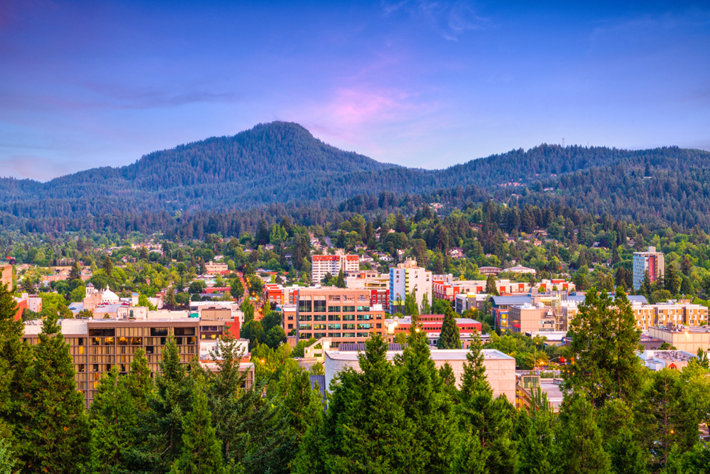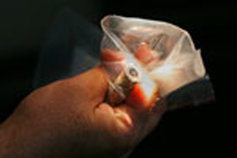Eugene, Oregon—Drug Abuse
Eugene, Oregon, Alcohol and Drug Addiction Information

Eugene, Oregon has a population of 137,893 and is located in Lane County. The city is located at the south end of the Willamette Valley at the confluence of the McKenzie and Willamette Rivers. Eugene is the second largest city in the state.
Eugene is home to the University of Oregon which along with local government and the Sacred Heart Medical Center are the city’s largest employers. The city’s biggest industries include wood products and recreational vehicle manufacturing.
The city gets its motto, “The World’s Greatest City of the Arts and Outdoors,” from the dozens of recreational opportunities including kayaking, biking, rafting, hiking plus the city-supported Oregon Country Fair, Oregon Bach Festival and the Oregon Festival of American Music. There are also numerous venues for the performing arts for theater and music as well as more than twenty privately owned art galleries.
Eugene tends to rate lower than the national average in crime rates except for larceny and arson. Eugene also continues to have an ongoing drug problem.
Eugene Oregon’s Drug Situation

WIth a major college campus forming a considerable anchor for the community, the average age of the city is lower than the rest of the state.
In 2014, 20% of Eugene’s population was in the prime drug-abusing age band, from 15 to 24. In 2014, a drug dealer in town was arrested with a huge quantity of MDMA (Ecstasy), four pounds of marijuana, three pounds of psilocybin mushrooms, some cocaine and a pile of cash. Except for the cocaine, these drugs are most likely to be used by young people going to parties or musical events. This assortment of drugs is also likely to be found in drug busts in other parts of the state.
MDMA often comes across the Canadian border to the north. Some rural regions of Washington are well known for their cultivation of psilocybin mushrooms. As for marijuana, there are four counties in Oregon that each has more than 3,000 licensed medical marijuana growers. Three more counties have between 2,000 and 3,000. And these are only the medical growers. With recreational marijuana just approved in 2015, more growers will arrive on the scene.
Advocates promised that legalizing this drug would bring its trafficking under control. However, a report from the Oregon Department of Justice stated that of the illicit outdoor marijuana grows eradicated by law enforcement, 97% were being run by Mexican drug cartels.
Other drugs trafficked into the area include LSD, ketamine, hash oil, khat, and synthetics 2C-E and DMT.
Heroin is a constant threat in the state and in Oregon. Many people progress to buying and using heroin after initially getting hooked on prescription painkillers like OxyContin.
Arrests for methamphetamine possession are common in the Eugene area, but this is not generally a drug that college students abuse.
The Dwindling Spiral Will Continue

Once drug abuse starts, an individual will usually think he can use drugs or drink excessively and get away with it. It will probably take a while for the serious damage to show up.
Of course, there are exceptions to that. Some people overdose the first time they use heroin or Ecstasy. Fatal overdoses are also possible at any time with alcohol, synthetic drugs, methamphetamine or cocaine. The basic fact is that when one is abusing drugs or drinking to excess, one’s life could end at any moment.
The only safety is in sobriety.
Aside from the risk to life, drug or alcohol abuse takes a gradual toll on one’s self-respect, personal integrity, morals and productivity. Sooner or later (usually sooner) the damage begins to show up. Finances are trashed, relationships are damaged or end. Families are traumatized. A person loses everything of value and can even be left homeless.
Along the way, family and spouses work hard to prevent the worst of the damage. But the price is their heartbreak. Eventually, there is no other conclusion they can come to than the need for drug rehab in Eugene, Oregon.
Choosing a Drug Rehab and Addiction Treatment Program

When an individual or a family is looking for drug rehab, what should they consider? How long is the program? A 28 to 30-day program seldom offers enough time to both recover from the damage and build new life skills. What is the basic philosophy of the program? Does the family agree with this philosophy?
Many programs teach that a person should consider himself “always an addict.” There are two ways to interpret this concept. One is that a person who has been addicted in the past should always be on guard to any deterioration that might show they are headed back toward drug or alcohol abuse. The other is to take this statement literally, that a person can’t recovery from alcoholism or addiction, ever.
Many people do not choose to agree with this latter concept and the end result we strive for at a Narconon drug rehab center is that an individual knows how to stay sober and create a productive enjoyable life for himself. We do not encourage anyone to consider themselves an addict. In fact, many people specifically say that they know they are no longer an addict when they complete the Narconon rehab program.
Should the Drug Rehab Location Matter When It Comes to Finding a Solution to Addiction?
When a family realizes that one of their loved ones is addicted, it very often becomes their highest priority to save that person’s life and protect other members of the family. Saving a person deep in addiction can be very hard to do. Most of the addicted reject help at first. Many people go through rehab after rehab —sometimes more than a dozen programs—only to fall back into drug use when the program is done.
The location of a drug rehab program can play a role in whether or not a person finds lasting recovery.
Consider the situation of a person who goes through an outpatient program in his home town. Every night, he or she spends time away from the support of the program. He could be visited by his drug dealer or former girlfriend who’s still using drugs. All his contacts for obtaining drugs are just a phone call away—they might even deliver to his front door.
Many people have a better chance of recovery if they are in a 24/7 rehab that’s far from home. All the support that is needed is right at hand. The person in recovery gets to recover his self-respect and learn new life skills without being assaulted by the people, places and things involved in the former drug or alcohol use. There’s a little distance from all the usual triggers, meaning the person can catch his breath, so to speak, while he gets stronger and ready to face all the challenges in his life.
The Narconon program offers a sound method of building a new life from the ashes of the old one. For fifty years in some fifty centers, the addicted have been learning to live new lives without reliance on either drugs or alcohol.
Narconon New Life Retreat Helps END Addiction and Alcoholism FOR GOOD.
The Narconon drug and alcohol rehabilitation program is drug-free which means we never substitute one drug for another. We also never diagnose a person with a mental condition that would require treatment with a psychotropic (affecting the mind, emotions or behavior) drug. Instead, we rely on nutritional supplements to help a person throw off the effects of drugs that were being taken.
Our sauna-based detoxification program helps lift a person’s mood out of the continual grayness of drug abuse. Once a person begins to repair the damage from his past, he begins to feel hope for the future and at that point, he can see for himself that no drugs are needed for his rehabilitation.
A Narconon Program Graduate:
- Has recovered his self-respect and found relief from guilt
- Has learned how to confront issues in his life and solve problems
- Has gained strength and resistance to the presence of triggers
- Has gained the skills to repair relationships he damaged in the past
- Has a better understanding of himself, his family, social or work groups he’s part of, and more
Call anytime to speak with one of our counselors about our program. We will take the time to answer your questions whether it be for yourself or a loved one.
It is possible to replace the loss and pain of alcohol or drug addiction with a productive, enjoyable life.
Call now.